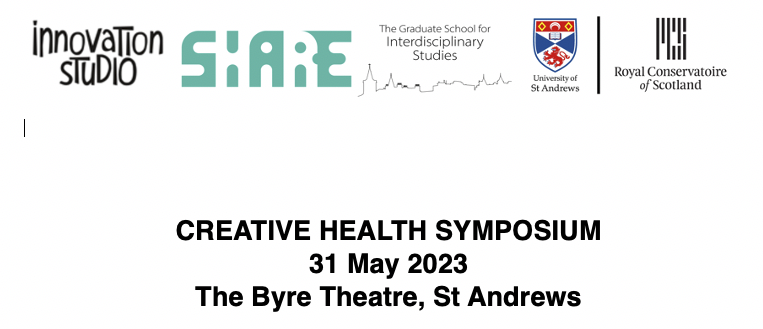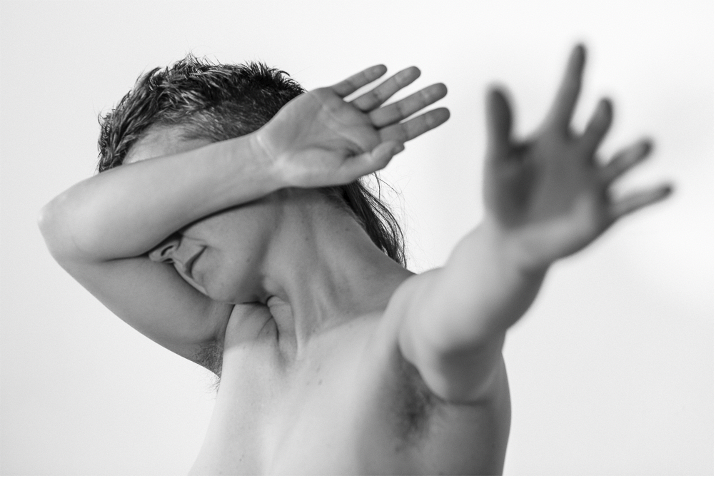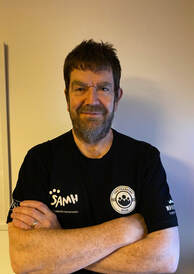After coming across a call for artists/writers to submit a proposal for this year's Creative Health Symposium, hosted at the Byre Theatre, St Andrews, I was delighted when my 'pitch' for a 10-minute talk was accepted.The Symposium comprised a series of events showcasing how writers, musicians, and artists are engaging with audiences under the overarching theme, Creative Health. This was organised by SHARE (Sciences, Humanities and Arts Research Exchange), RCS Innovation Studios, and the Graduate School for Interdisciplinary Studies at the University of St Andrews. Described as an 'in-person, interdisciplinary symposium on the theme of Creative Health, with presenters, performers, and participants from a broad array of artistic, scientific, medical and humanities disciplines,' this symposium was held in the Byre Theatre's conference suite. The event was free, with lunch and refreshments provided. The speakers covered a diverse array of creative topics, relating how they apply writing, music, and even computer gaming to engage with individuals and communities, especially those who are disadvantaged in any way. These ranged from using music directly, memoir writing (cough), poster design, touch-screen information, and many other creative processes. The invited speakers included Claire Ruckert, Ines Jentzsch and Rachel Drury, Mary Black, Thulani Rachia, Amadu Khan, Emily Davis and Beth Whiteside, Catherine King, Kai DurkinClaire Ruckert, Ines Jentzsch and Rachel Drury, Mary Black, Thulani Rachia, Amadu Khan, Emily Davis and Beth Whiteside, Catherine King, Kai Durkin, and myself. After the morning session of 10-minute talks (the most nerve-wracking moments of which were the facilitators brandishing A4 deadline sheets indicating '2-minutes remaining'!), the attendees broke off into small groups for thematic conversations. Posters designed to illustrate the core theme were shared. After lunch there were 15-minute creative presentations (film/music/performance/participatory) featuring Sarah Hopfinger (dance, disability), Kathryn Steven + the poet-doctors (medicine, writing), Ellen Thomson and Kally Lloyd-Jones, John de Simone, Sonia Allori (in collaboration with Laura Gonzalez), Wan Sheng Kenneth Tay, Lynsey Brown, Kenneth Boyd, and Andrew Williams. The inspirational day concluded with a workshop, and optional art/craft activities. My pitch:What my 10-minute walk will focus on: TITLE: MIND GAMES AND MOOD MUSIC Aged 25, I was diagnosed bipolar. At my lowest ebb, I considered suicide and spent time in a locked psych ward. At my highest, I was existing on a few hours’ sleep, binge drinking and churning out bestselling (never completed) novels. I’ve played in bands since the late 70s, eventually recording a BBC Radio 1 session. My passion for music has been crucial to my recovery and ongoing wellbeing. A long-lapsed love in my life, Hibernian FC, has been reignited, especially since joining an outreach programme for fans with lived mental health issues organised by the Scottish Association for Mental Health. This group has evolved, collaborating with similar initiatives in clubs across Scotland, and we’re busy rolling out our self-help hub to the wider community. I’ve also written a memoir about my experiences which I’ve spoken about in schools, community groups, and prisons. A question: “Music and sport have massive potential for inspiring positivity. With suicide remaining the biggest killer of males under 45 how can we tap into these communal passions to promote better health?” A work to share: Readings from my memoir: 1976 – Growing Up Bipolar. My 10-minute talk (cut much shorter by time constraints and inadvertently pressing some random button on the iPad causing my script to vanish for long seconds. While the audience waited. And the camera recording the event for posterity kept rolling... )Good morning. My name is Mark Fleming, and I’m delighted to have been invited along to talk to you about my lived experience of illness and recovery from a mental health condition. I begin by quoting a familiar statistic. Around one in four people are estimated to be affected by mental health problems in Scotland in any one year. Does this imply that three in every four people coast through their days, unduly affected by stress? Of course not. These figures merely illustrate those individuals who have taken the step to admit their problems and seek the medical counsel that has allowed their condition to be classified, whether that’s an anxiety disorder, depression, bipolar disorder, post-traumatic stress disorder, schizophrenia, an eating disorder, disruptive behaviour, or various other disorders. But since a cardinal symptom of having a mental health issue is often denial, putting on a brave face that masks the truth, it would be fair to describe one-in-four as the metaphoric tip of the iceberg. Factors impacting mental health We all have mental health, but such is the complexity and fragility of the human mind, it is all too easily derailed by one or more of a wide range of factors.
The bipolar scale I was diagnosed with manic depression in 1987, a condition now referred to as bipolar, and characterised by mood swings, from extreme highs (mania) to extreme lows (depression). Like the majority of patients who receive this diagnosis, I was a young man (in my mid-20s at the time). Bipolar has often been characterised by a scale running from 0 to 10. This scale is certainly not meant to be definitive in any way, but it does serve a purpose in indicating possible behaviours, many of which will strike a chord with anyone who has lived with a bipolar condition. The inference is the majority of people tend to live their lives around a middle zone, between five and six, their moods balanced. This will dip according to certain situations as everyone will go through challenging events such as family bereavement, relationship breakups, job loss, adverse medical diagnoses, or any number of other exacerbating influences that can have a negative effect. Conversely, lives can be invigorated by positives: getting married, childbirth, holidays, job promotions. Beyond this Meridian, individuals can slide into mild to moderate depression. On that bipolar scale, this would be indicated by lapsing into four. Three. Feelings of panic and anxiety, difficulty with concentration, poor memory. Down to two. Slow thinking. Lethargy. A lack of appetite. A desire for solitude. Erratic sleep patterns, either excessive sleeping or insomnia. Overwhelming notions that everything has become a struggle. This can sink down to one: severe depression, feelings of hopelessness and guilt, isolation becoming agoraphobia. Finding it impossible to do anything. When bipolar hits into zero, the sufferer might be plagued by suicidal thoughts, the notion there's no way out and everything is bleak and it will always be this way. At the other end of this scale is hypomania, when a balanced mood veers into seven or eight. Becoming extremely productive, doing everything to excess whether that's using the phone or other mobile gadgets, writing, smoking, drinking alcohol or taking recreational drugs. A person can become talkative and extremely charming. Have an inflated self-esteem, characterised by rapid thoughts and speech. These flights of fancy might seem fill an individual with optimism and a sense that they could achieve anything, undertaking a variety of tasks simultaneously. But the result of attempting to spin too many proverbial plates is inevitably counterproductive. Many diagnosed with bipolar are prepared to live with the consequences of swerving into hypomania, because of the periods of extreme creativity this can inspire. Unfortunately, this elevated sense of excitement is delusional, and hypomania will only last for short bursts. When this unnatural euphoria becomes prolonged – right up to nine and 10 on the bipolar scale, it is classified as mania. Losing touch with reality. Becoming incoherent. Very little sleep, reckless behaviour, religious delusions, hallucinations. Sectioned in 1987 In 1987 I was diagnosed with a serious mental health condition, initially described as a schizophrenic episode. I was working in a clerical job involving long hours with compulsory overtime. Still in my mid 20s, I assumed the best way to counteract this mundane day-to-day existence would be to continue partying as I had when I've been a Napier University student up until the previous summer. My weekends consisted of 9 am starts both Saturday and Sunday while remaining a hedonistic clubber who spent his leisure time drinking in Buster Browns nightclub until last orders at 3 am. When I eventually hit a metaphoric wall, my health unravelled rapidly. I became introverted, couldn't see a future. Withdrawing from my social circle, I was signed off work with what was euphemistically referred to as stress. Hiding away in my bedroom, I refused to speak to friends who phoned up to ask how I was getting on. I approached the stage where any sort of professional intervention would have been meaningless. My parents were seriously concerned about my erratic behaviour and insisted I see my GP. But with my delusions hurtling out of control, I was convinced my GP wasn't a doctor at all but a football hooligan masquerading as a health professional. When he prescribed antidepressant tablets, my mind had become so unhinged I assumed taking them each night was a form of prolonged euthanasia. I thought my parents and this quack had conspired to poison me. Things came to a head one night when I became so delusional I assumed the only way to make myself better was to knock myself unconscious – a drastic form of resetting. Like switching a computer off and on again. I headbutted my bedroom wall. All this did was give me concussion. My parents burst into the room alarmed at the mysterious thuds emanating from my room. My dad was forced to sit on me to prevent me from self-harming, while my mum dialled 999 and requested an ambulance. Because this was a violent incident, the ambulance arrived with a police escort. I was secured in a straitjacket and taken to the intensive psychiatric care unit at the Royal Edinburgh Hospital. Sometime later, I was formally sectioned. There followed a lengthy period of rehabilitation involving intense medication and occupational therapy. I was eventually granted weekend passes and after being discharged a painstaking readjustment began. Many months later I got a job as an administrative assistant in the Scottish government, although my position was probational due to my health condition. Hypomania in 1990 On that one to 10 scale I was firmly in the middle section, and this persisted for another three years until the bipolar planets aligned again and I started creeping further up the scale. I’d left home for the first time, became a lodger in my sister's flat. This meant I had so much more freedom to go out socialising. I just started a new job in a different department in what was then called the Scottish Office, making friends. My social life was buzzing but I found it difficult to focus on anything, my workload or leisure pursuits. I had fantastical notions about writing a bestselling novel or collection of short stories to add to the ones I'd had published over the years. My turbulent imagination encroaching on 10 (full-blown mania), I was hospitalised again. The outcome of this was being placed on long term antipsychotic medication for a period of almost 30 years. Touch wood, I haven't sunk/soared into the lower or upper ends of that bipolar scale since then, but have finally come off lithium. Lithium is a drug that can certainly improve mental outlook by suppressing extreme emotions, but it also has notable side effects, particularly the way it can impair organ functions: especially the thyroid gland, the kidneys, and the liver. Whilst I was on lithium I was monitored every three months by getting my blood checked on my local GP's. However my mental outlook was never monitored in the same way. Coming off lithium, music, and walking Eventually I made an appointment myself at an outpatients clinic in Edinburgh and requested coming off lithium. The psychiatrist referred to my file and seemed perplexed - no one else on her books had been a lithium patient for so long. Since coming off the drug I've tried filling my life with other positives. I've always been really into music. Aged 17, back in the late 70s, I joined my first punk band. Long before experiencing the manic depression of my mid 20s, I was playing gigs regularly and my band featured on Radio One. Music has always been extremely important to me, and the element most crucial in lifting me from severe depression in 1987 wasn't medication or occupational therapy: it was my sister bringing my Walkman during a ward visit. I also love the great outdoors. Living in Portobello, next to the Firth of Forth, there are fabulous walks nearby. This is another tremendous way of recharging the batteries. During lockdown, I started aiming to do X thousand steps daily, going to different locations with my headphones on and absorbing uplifting playlists. BrainBomb, a semi-autobiographical novel In 2009 I published a semi-autobiographical novel based on my time in the intensive psychiatric care unit, entitled Brain Bomb. Because of the manic delusions and heavy medication, so much of what I’d been through was a mystery. I made up for the extensive blanks by injecting the narrative with fantastical sequences, partially inspired by the time-travelling adventures of Billy Pilgrim in Kurt Vonnegut’s Slaughterhouse 5. Then I had a lightbulb moment. Like any mental health story, maximum impact and poignancy would be achieved if I told the truth. I applied for my case file from the Scottish NHS. This opened a window into my breakdowns, from painstakingly recorded observations from nursing staff in the ICPU, to recommendations for treatment by various psychiatrists, including, if the pills were unsuccessful, electroconvulsive therapy. What I was then able to write was a memoir. Flashback to 1976 - an incident triggers a slow-burning depression I've described how my mental health dipped in the summer of 1987. But mental health can be triggered by all those factors I've mentioned, including childhood trauma. I believe my depression didn’t suddenly erupt over a few months when I was 25. My inexorable slide began much further back, instigated by an incident during the long, hot summer of 1976. When I was 13, at a Sunday school picnic, I was abused by a predatory pedophile male. I became extremely withdrawn. Having only just started my secondary school, I wasn't socialising as I had done when I was a primary school kid. I lost interest in the football team I’d been fanatical about – Hibernian. I drifted into deep introspection, although I did latch onto different influences. This was the 70s, the era of the Sex Pistols and The Clash who were busy exciting teenage culture. I bought a guitar and started a punk band. I discovered alcohol, the double-edged sword that brought hours of euphoria and confidence, tempered with hangovers and dipping moodswings. I also latched onto Northern Irish politics, draping my bedroom walls in red hand flags. Changing Room - tackling mental health at Hibs and Hearts and beyond Last year I read about a fan initiative being launched at that had been launched at Easter Road stadium, the home ground of my childhood heroes, Hibernian FC. This was called the Changing Room, instigated by the Scottish Association for Mental Health. This outreach initiative as a 12 week programme with one goal: to promote men's mental health and wellbeing through the power of the beautiful game. This hugely successful initiative has since been rolled out to clubs across Scotland, while Scottish Government funding has been provided to launch Changing Room Extra Time sessions to build on the existing programmes, while the Changing Room for Young Women has also been launched at Hibs and Hearts football cubs for women aged 18 to 30. Attitudes to mental health have been evolving steadily since my first psychotic episodes in the 1980s. The situation is never likely to be perfect, but considerable steps have been taken to reduce stigmatisation. This Symposium exemplifies how creative people are continually inspired to seek exciting ways of maintaining positivity and wellbeing. Comments are closed.
|
|



 RSS Feed
RSS Feed
